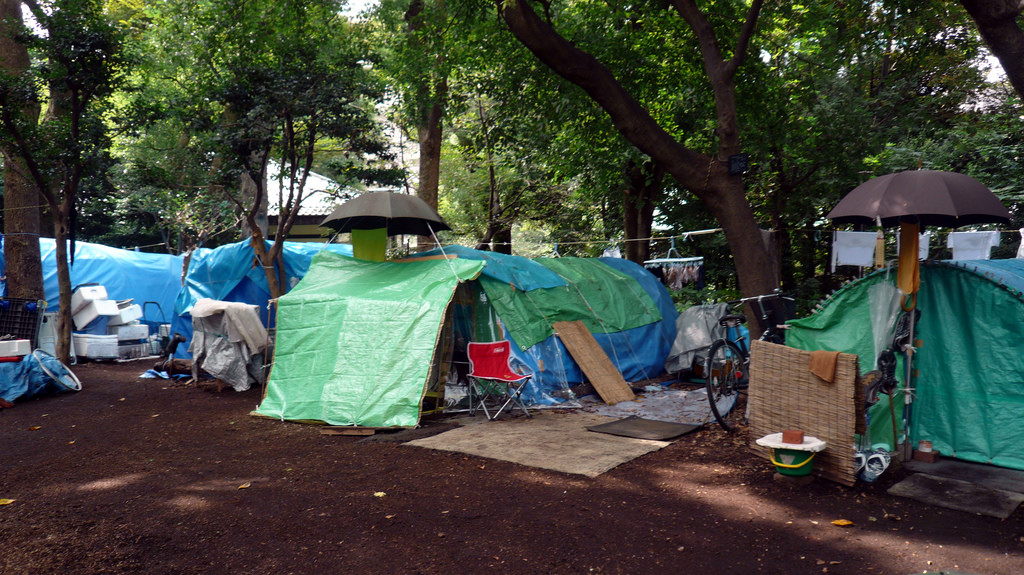Beneath the rumbling overpass where Highway 160 crosses Northgate Boulevard, some two-dozen homeless men and women rest, shaded from the relentless afternoon sun. Sleepy pit bulls, bicycles and crumpled camping equipment lay among them as the people socialize, read and nap on this dusted plot of land.
Stacy Selmants, lounging beneath a small tree, rises to join two women seated next to the bike trail as they talk about why they’ve chosen this hardened plot to see out the day.
“We’re here to avoid the rangers,” Selmants, 56, says as she takes off her battered 49ers cap. “We’re afraid to go back to our camps, because they’ll kick [us] out.”
Each afternoon, up to 30 homeless men and women congregate alongside the bike path under Highway 160 to escape not just the harsh summer elements, but also Sacramento authorities. This is one of the few spaces in the region they can rest without police or rangers forcing them to move. As a result, it has turned into a spot for them to socialize and receive donations before the evening, when they can again set up camp along the wooded river.
Whenever someone down here asks how you’re doing down here, Selmants says, you usually say, “Same shit, different day.” This is only in part a joke.
The average American River Parkway camper’s day starts at 5:30 a.m., when he or she packs up and hurries onto the streets before park rangers arrive (usually around 6 a.m.) to hand out citations. The campers then make their twilit exodus to Friendship Park at Sacramento Loaves & Fishes, where they can spend the morning eating and cleaning up, as well as utilizing the center’s other services for the homeless.
When Friendship Park closes at 2:45 p.m., its destitute patrons must find a place to rest and wait for the sun to set. Often, they post up under a building’s shade in the neighborhood surrounding Loaves & Fishes and Quinn Cottages. Some cool off at the beach or, like Selmants today, set up in the Highway 160 underpass and wait for the rangers to go home around 6 p.m.
“Sometimes, they’re even out until 7,” says Linda, an acquaintance of Selmants’, who prefers not to give her last name.
Linda, roughly Selmants’ age, wears dark sunglasses and a black zip-up sweatshirt. She sits in a black camping chair, right hand over a paperback copy of Steve Berry’s The Third Secret—a summer thriller read. Her left hand and forearm, also resting on her lap, are badly swollen, though she does not mention why.
Alcohol is prohibited here, and though the rangers never make the campers move out from under the highway, they closely monitor the crowd. The campers seem to be on good behavior (many are), but after some time, a man ducks behind a tree to take a swig of beer. A few minutes later, a light, lingering scent of marijuana wends through the crowd.
At first blush, there is a toughness to this group. Most Sacramentans might not feel comfortable down here, and rumors often spread among cyclists of run-ins with campers on the path. But it is a necessary thoroughfare for bikers commuting between the central city and north Sacramento, so traffic remains high.
Bicyclists, as well as joggers, pass the campers with increased frequency as the workday ends, and while it’s certainly not the safest place to spend an afternoon, Linda notes that even Gov. Jerry Brown used to run by on occasion—security in tow.
Ask just about anyone down here, and they’ll tell you the homelessness problem has gotten worse in recent years. Linda says she’s noted a rise in women on the streets, estimating that they now make up 35 to 40 percent of the homeless population.
When asked about last January’s Sacramento Steps Forward Homeless Street Count, which found 2,538 folks without homes in the Sacramento region—only 786 of them unsheltered—the women scoff. Linda recalls the volunteers coming through that rainy evening at around a quarter to midnight. “I didn’t even get out of my tent,” she says. Though her camping partners were counted, she was not.
“Should tell you how accurate that was.”
The afternoon wears on, and those below the highway begin to pack their things and move on down the trail, where the Wednesday food truck will be arriving.
Many Sacramentans, in fact, come to the underpass to help the campers out. They bring leftovers from parties, or they give away some clothing or used camping gear. On hot days, much to the campers’ delight, they’ll hand out frozen bottles of water.
Selmants begins packing her things. Linda again picks up her book. They’ll both be going down to the food truck shortly. Then, after the park rangers leave, they’ll return to set up their camps. Neither is sure how long they’ll be out here. They’re pursuing housing options through Loaves & Fishes, but this can often take time. Until then: wake up at 5:30, afternoons in the underpass and evenings at camp.
Same shit, different day.
